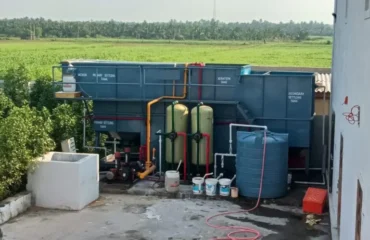In Dewas, waste water treatment plants (WWTPs) are essential infrastructure for managing wastewater from various sources, including residential, commercial, and industrial areas. Among these, Effluent Treatment Plants (ETPs) and Sewage Treatment Plants (STPs) play crucial roles in ensuring environmental sustainability and public health. Let’s delve into the significance of these plants in Dewas and their contributions to a cleaner and healthier environment.
Effluent Treatment Plants (ETPs)
Effluent Treatment Plants (ETPs) are designed to treat industrial effluents, which often contain complex pollutants and higher concentrations of contaminants compared to domestic sewage. The primary objectives of ETPs include:
- Pollutant Removal: ETPs utilize various treatment processes such as chemical, physical, and biological methods to effectively remove pollutants, heavy metals, and other harmful substances from industrial wastewater.
- Compliance: Ensuring that treated effluents meet regulatory standards and environmental norms, thereby preventing the pollution of water bodies and soil.
ETPs are vital for industries in Dewas to minimize their environmental impact and comply with stringent environmental regulations.
Sewage Treatment Plants (STPs)
Sewage Treatment Plants (STPs) focus on treating domestic sewage from residential areas, commercial complexes, and institutions. The key functions of STPs include:
- Biological Treatment: STPs employ biological processes such as activated sludge, aerobic digestion, and anaerobic digestion to break down organic matter and pathogens present in sewage.
- Clarification and Disinfection: After biological treatment, sewage undergoes clarification and disinfection processes to remove solids and kill harmful microorganisms.
- Environmental Protection: STPs ensure that treated sewage meets stringent quality standards before being discharged into water bodies or reused for non-potable purposes, thus safeguarding public health and the environment.
STPs are essential infrastructure in Dewas to prevent waterborne diseases, maintain water quality, and promote sustainable water management practices.
Benefits of WWTPs in Dewas
- Environmental Protection: WWTPs play a crucial role in preventing the pollution of water bodies, soil, and air by effectively treating wastewater and effluents before their discharge.
- Public Health: By removing contaminants and pathogens, WWTPs significantly reduce the risk of waterborne diseases, contributing to overall public health improvement.
- Resource Conservation: WWTPs promote water reuse and conservation, supporting sustainable water management practices and reducing freshwater demand.
- Compliance and Sustainability: WWTPs assist industries and communities in complying with environmental regulations and fostering a culture of environmental stewardship and sustainability.
In conclusion, waste water treatment plants, including ETPs and STPs, are indispensable for Dewas’ environmental sustainability, public health, and economic development. Through continued investments in advanced technologies, regulatory compliance, and public awareness, Dewas can achieve a cleaner and healthier environment for its residents and future generations.


